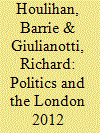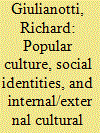| Srl | Item |
| 1 |
ID:
113282


|
|
|
|
|
| Publication |
2012.
|
| Summary/Abstract |
This article traces the emergence of security at the Olympic Games as a key concern of host governments and of the Olympic movement and analyses the implications of this heightened concern for the delivery of the Games, the local host community and for national security policy. It is argued that the Olympic Games, as a high profile media event, provide an increasingly attractive political opportunity structure for a range of political actors-an attraction that is intensified when the Games are held in a world city such as London. Since the 9/11 attacks in New York there has been a sharp increase in security expenditure for the Olympic Games, arguably significantly out of proportion to the likely risk. The cost of security has risen from approximately $108 million in 1996 (Atlanta) to an estimated $1.99 billion in 2012 (London). It is argued that the period since 2001 has been characterized by hyper-insecurity and a culture of intense risk aversion based not on probability but on the possibility of attack. Among the consequences of this development is a desensitization of host nations to the increased securitization of their cities. It is also argued that the impact on the local UK host community of Newham will be significant not only as a result of the intense level of policing, but also owing to the redevelopment associated with the Games and the use of the surveillance infrastructure to create a virtual gated community in the post-Games athletes' village. The article concludes by discussing some of the longer-term implications of the increased securitization of the Olympic Games, including the normalization of intense surveillance, the further encroachment on civil liberties and the growing tension between the values espoused by the Olympic movement and the reality of a successful delivery of the Games.
|
|
|
|
|
|
|
|
|
|
|
|
|
|
|
|
| 2 |
ID:
078250


|
|
|
|
|
| Publication |
2007.
|
| Summary/Abstract |
The article examines the construction of critical, resistant identities among supporters of the powerful Scottish football club, Rangers. The analysis is underpinned by two general arguments relating to identity construction: (1) the need to examine carefully the cultural politics of relatively advantaged groups within the field of popular culture and (2) the need to explore how forms of cultural resistance and contestation are focused particularly on relations within the popular culture, rather than on forms of determination by the wider societal order. The article draws heavily on substantial fieldwork with Rangers supporters in the UK and overseas. The findings highlight the complex and contingent relationships between popular culture and broader societal forces, as illustrated by the diverging arguments of Rangers fans on the legitimacy of ethno-religious and market-focused identities within football
|
|
|
|
|
|
|
|
|
|
|
|
|
|
|
|
| 3 |
ID:
105402


|
|
|
|
|
| Publication |
2011.
|
| Summary/Abstract |
This paper examines the role and contribution of peacemaking to the wider sport, development and peace (sdp) sector. Particular attention is paid to a hitherto under-explored subject: the complex position of the military vis-à-vis sport and sport-related peacekeeping. Through an historical overview of the sport-military intersection, reference to fieldwork in Bosnia and Liberia, and a brief examination of the Conseil Internationale du Sport Militaire, some critical and cautious conclusions are put forth. We suggest that sport-based peacemaking interventions provide the military with a new kind of institutional function, and fresh ways of building positive social links to civilian populations. However, such engagement is only possible if full dialogical engagement between civilians and peacekeeping forces is established, in which the military adapt their practices to suit the local cultural context.
|
|
|
|
|
|
|
|
|
|
|
|
|
|
|
|